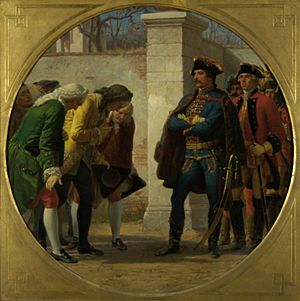1757 raid on Berlin facts for kids
Quick facts for kids 1757 raid on Berlin |
|||||||
|---|---|---|---|---|---|---|---|
| Part of the Third Silesian War (Seven Years' War) | |||||||
 Der Überfall auf Berlin 1757 by Karl von Blaas, 1865 |
|||||||
|
|||||||
| Belligerents | |||||||
| Commanders and leaders | |||||||
| Strength | |||||||
| 5,100-strong raiding party (including troops assigned to guard supply bases) | 5,521-strong Berlin garrison | ||||||
The 1757 raid on Berlin was a quick attack on the city of Berlin. This happened during the Third Silesian War, which was part of a bigger conflict called the Seven Years' War. Soldiers from the Holy Roman Empire rode into Berlin, the capital city of Prussia. They took over the city for a short time.
Why Did the Berlin Raid Happen?
After a war called the War of the Austrian Succession, old alliances in Europe changed. Countries that used to be friends became enemies, and enemies became friends. This big change was known as the Diplomatic Revolution. It led to the start of the Seven Years' War.
Frederick II was the King of Prussia. He was a big rival of Maria Theresa of Austria, the Empress of the Holy Roman Empire. In 1756, Frederick invaded a region called Silesia. But he lost an important battle at Kolín on June 18. After this defeat, Frederick didn't protect the path to his capital city, Berlin.
The Attack on Berlin
Austrian military leaders noticed that Berlin was not well-guarded. So, Prince Charles of Lorraine, who led the Austrian army, sent a Hungarian cavalry officer named Count András Hadik. Count Hadik led about 5,100 soldiers, mostly fast-moving Hungarian hussars. Their mission was to capture Berlin.
However, Hadik left some of his troops behind to guard his main supply base. This meant his raiding party was actually smaller than the Berlin army. The Prussian soldiers in Berlin didn't expect an attack.
The City's Defense and Ransom
On October 16, Hadik and his soldiers arrived outside Berlin. The Prussian defenders were surprised but refused to give up the city. Hadik quickly attacked the city gates and entered Berlin.
General von Rochow, the city's military governor, thought his forces were outnumbered. He quickly moved the royal family to a safer place called Spandau. Count Hadik then demanded that the city council pay a large sum of money. He asked for 200,000 thalers (an old type of money) and twelve pairs of gloves for the Empress.
The city paid the ransom. But Hadik didn't stay long. He quickly left Berlin when he learned that a large Prussian army was coming. This army, led by the Prince of Anhalt-Dessau, was marching to stop him.
 | Audre Lorde |
 | John Berry Meachum |
 | Ferdinand Lee Barnett |

